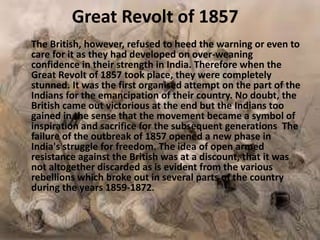Struggle for freedom
- 1. INDIA’s STRUGGLE FOR FREEDOM BEFORE 1947 AND AFTER 1947 BY- KANAK DAGA 10-B
- 2. BEFORE 1947…
- 3. In ancient times, people from all over the world were keen to come to India. The Aryans came from Central Europe and settled down in India . The Persians followed by the Iranians and Parsis immigrated to India. Then came the Moghuls and they too settled down permanently in India. Chengis Khan, the Mongolian, invaded and looted India many times. Alexander the Great too, came to conquer India but went back after a battle with Porus. Lastly, the Britishers came and ruled over India for nearly 200 years. After the battle of Plassey in 1757, the British achieved political power in India.
- 4. "Long years ago we made a tryst with destiny and now the time comes when we shall redeem our pledge, not wholly or in full measure, but very substantially. At the stroke of the midnight hour, when the world sleeps, India will awake to life and freedom." This was the speech made by Jawaharlal Nehru, as the Prime Minister of an Independent India, addressing the constituent assembly and the Indian nation on 15 1947.
- 5. Role of Associated Movements ? India’s struggle for freedom had been a long drawn out battle. Though it actually began in the second half of the 19th century, isolated attempts were made in various parts of the country to bring the British rule in India to an end about a century earlier. The real power in northern India passed into the hands of the British in 1757. The loss of independence provided the motive force for the struggle for freedom and Indians in different parts of the country began their efforts to throw off the yoke of the alien rulers. It took over 100 years for the struggle to gain full momentum.
- 6. Great Revolt of 1857 The British, however, refused to heed the warning or even to care for it as they had developed on over-weaning confidence in their strength in India. Therefore when the Great Revolt of 1857 took place, they were completely stunned. It was the first organised attempt on the part of the Indians for the emancipation of their country. No doubt, the British came out victorious at the end but the Indians too gained in the sense that the movement became a symbol of inspiration and sacrifice for the subsequent generations The failure of the outbreak of 1857 opened a new phase in India's struggle for freedom. The idea of open armed resistance against the British was at a discount, that it was not altogether discarded as is evident from the various rebellions which broke out in several parts of the country during the years 1859-1872.
- 12. Corruption is found in the government when instead of thinking about the interests of the citizens as a whole, the members of the government are chiefly interested in promoting their own selfish interests. Corruption is found in both public and private organizations and everyone starting from the clerk to the Managing Director of a company is corrupt in a way or the other. Corruption is an incurable disease which all the citizens should try to combat by hook or by crook. It is only because of the corrupt politicians that today India is burdened with enormous loans from the developed countries especially America and is not a fully developed and free nation. It is confines by the handcuffs of corruption.
- 15. INDIA’s FIGHT AGAINST LABOUR LAWS..

















